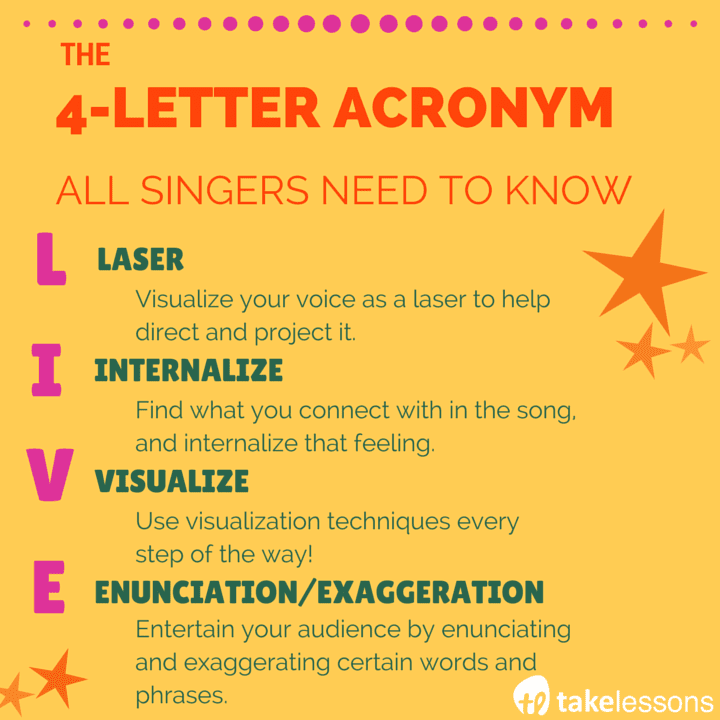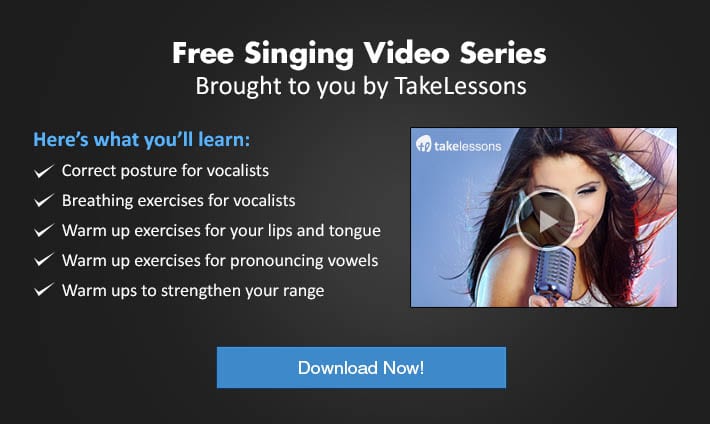Want to be a better singer and performer? Vocalists have a lot to think about, both before and during a performance. Here, Baltimore, MD voice teacher DeTrece L. breaks down the basics in an easy-to-remember acronym…
Are you an aspiring singer? If so, there’s one 4-letter acronym you need to know.
In this blog post, I’ll explain what it is and how you can become one. I’ll also share some tips on how to improve your vocal skills. So if you’re ready to take your singing career to the next level, keep reading!
Can You Make Yourself a Better Singer?
Many people believe that singing is a talent that you either have or you don’t. However, there are a number of things that anyone can do if you want to know how to make your singing voice better:
- For example, practicing regularly is important for developing good vocal technique.
- In addition, studying the music of great singers can help you to learn how to control your voice and produce beautiful tones.
- Finally, working with a qualified vocal coach can help you to identify and correct any bad habits that may be holding you back.
While it takes some work to become a great singer, it is definitely possible to improve your singing skills with time and effort. Here’s a video with even more benefits of taking singing lessons:
https://www.youtube.com/watch?v=CM9TQRoZJdw
What Makes Someone a Better Singer?
There are many factors that can contribute to making someone a better singer. Proper breath support and technique are essential for good vocal production.
Many singers find that working with a vocal coach or taking singing lessons can help them to develop their skills and improve their voice.
In addition, diet and lifestyle choices can impact the quality of a person’s voice. For example, smoking and drinking alcohol can both lead to vocal problems such as hoarseness and loss of range.
By making healthy choices and taking care of their voice, singers can help to ensure that they sound their best.
The 4 Letter Acronym to Become a Better Singer
Want to know how to get a better singing voice? Here’s the secret.
Many students have asked me how I sing with so much passion and color, regardless of the genre. My answer has always been the same: Let your heart sing! This is the best tip if you want to know how to sing better instantly.
Vocalists are the only musicians who do not have the option of making actual, physical contact with their instrument in order to produce a sound or tone. This is an important thing to consider when you’re thinking about how to be a better singer. It puts us at both an advantage and a disadvantage for a couple of reasons.
For example, advantages include not having to carry much with us to a gig or having to spend money replacing parts — we ARE the instrument. However, being the instrument can also be a disadvantage, as many things can affect our singing voice: the weather, our body’s natural hormonal balance, our diets, sleep habits, stress levels, and our emotions. Even sneezing too hard can cause an issue for some (especially if the sneeze happens while on stage… yikes!).
In my work as a music therapist, music educator, and artist development specialist, many of my clients bring some level of anxiety with them to our first voice lesson. By the time they leave, it is always my goal to have thoroughly expressed the necessity of sharing their emotional space with their audience, as this is what allows connection and authenticity. For example, if you are singing in a choir, it is the use of realistic and authentic gestures, facial expressions, and vocal color that can only be the result of connecting with the piece of music. This cannot happen solely on an intellectual level. This must happen in an emotional way, as well.
I am not suggesting that students expect a full-on therapy session whenever they go to a lesson or gig. On the contrary, I encourage my students and clients to utilize the following tools as ways to paint the song into the hearts and minds of the listener. I use the acronym L.I.V.E. to remind my students of these tools.
L – Laser
I have seen much success in employing metaphors and symbolism into my teaching style. One of my most popular metaphors includes visualizing the voice as a laser. Somehow, students are able to better understand how to direct their voices. This is specifically helpful for artists-in-training who are learning how to project and properly sing forward.
I – Internalize
Even the most touching song is only considered as such because the listener experienced some kind of emotional connection with the artist’s interpretation, the story of the song or even their own personal journey in life. Every song has several different avenues that lend toward artist connection and interpretation. Some artists connect with the melody, whether it’s haunting or flirtatious. Some feel more connected to the drum and bass of a song, while others are drawn toward its auxiliary instrumentation (strings, horns, etc.). Other artists connect with the lyrics, the actual story of the song.
Finally, some will find their emotional bearings through another artist’s interpretation of the song. These connections are certainly interchangeable, sometimes from moment to moment. This is where a vocalist can recall real life situations and repurpose them as spices and herbs in our musical stew.
V – Visualize
Anybody can sing karaoke! Chances are, if a student has worked with a private voice teacher or vocal coach, he or she is not aiming to just ‘get through the song.’ My guess is that the student aspires to be much more polished and skillful at the art of singing. Visualizing yourself performing, and using visualization as a way to prepare for that long phrase coming up, may be the difference between singing “pretty” and throwing down!
E – Explore Enunciation/Exaggeration
No, I’m not suggesting that every singer should aspire to become the Jim Carey of vocal acrobatics and shenanigans. I am suggesting we remember the fact that music is in the entertainment industry. As such, the most common underlying expectation people have when they come to a vocal concert is to be wowed and entertained.
One of the easiest and most accessible ways to entertain your audience is to allow yourself to enunciate and exaggerate certain words and phrases in the song. Enunciation can be a tool applied to the melody, rhythm, lyrics, or emotion. Choosing to lay back behind the beat, or to syncopate a phrase or two to express a certain mood, emotion, or color, may be what sets you apart from others musically.
Or, perhaps calling into mind that lovely person who cut you off in traffic may be just the thought to add some extra oomph into your version of a power ballad, blues number, or musical theater piece. (I generally use the phrase, “Put some STANK on it!”)
Got it? Here’s a recap of what to remember:
How to Become a Better Singer Fast
Remembering these tips to sing better can help you be a better singer and improve your stage presence. Additionally, exploration can be the difference between a working musician and a starving artist. Get out there and network! For example, in my lovely city of Baltimore, there are many clubs, venues, places of worship and coffee shops that provide ample time and opportunity to explore other genres, network, and much more. Get involved in the music community of your city to explore your musical authenticity!
And, that’s it! Let’s not separate our lives from our music. When it’s “go time” — the time to perform — the most memorable performances are by those who remember to L.I.V.E. through their music. Don’t just sing the lyrics, let your heart sing!
These tips will help you become a successful singer by finding your unique voice and connecting with audiences in an authentic way. So get started today by putting these four principles into practice in your singing lessons!
Thanks for reading!
 Post Author: DeTrece L.
Post Author: DeTrece L.DeTrece L. is a radio show host, artist development specialist, music therapist, music producer and singing teacher in Baltimore, MD. She has performed internationally since age 8 with stars such as Brenda Russell and Steven Tyler, and has been teaching singing lessons for over 15 years. Learn more about DeTrece here!
Photo by Robert Pratt
Suzy S.


